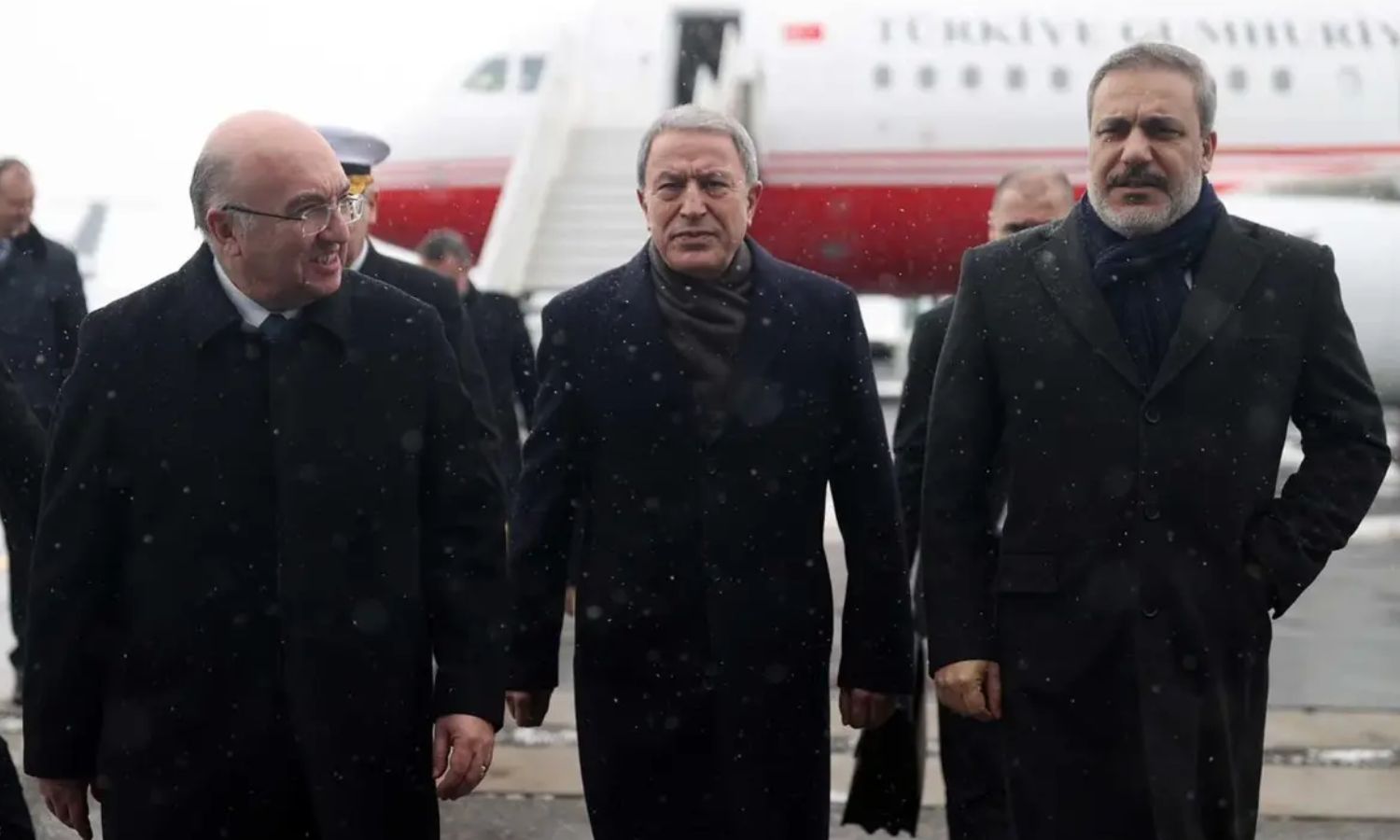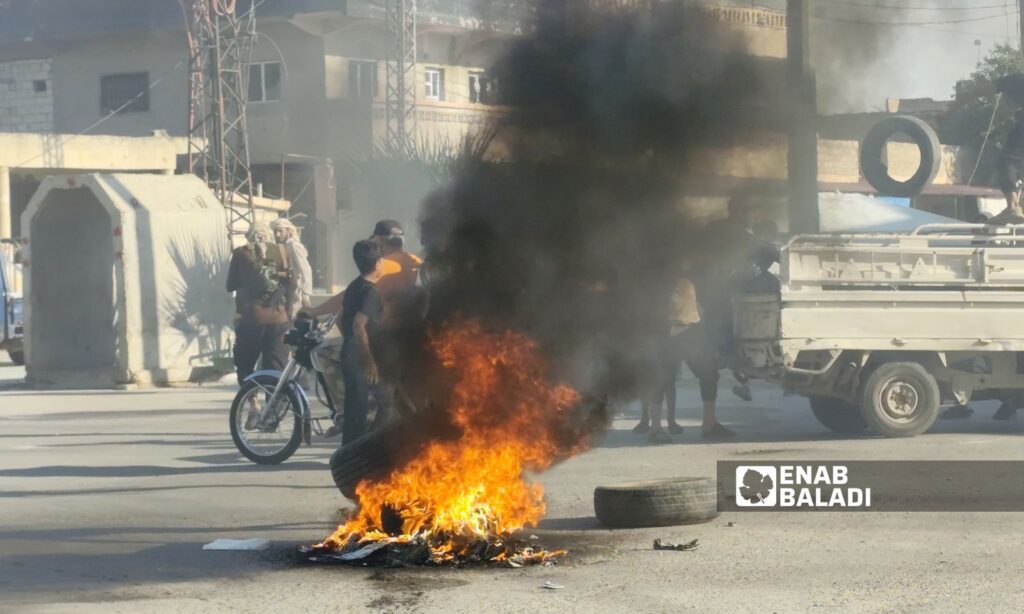Footage published by activists from northwestern Syria showing protests against Turkey dominated the scene in the region, especially since it is subject to Turkish military support and presence. The anger in the region is not a recent phenomenon linked to the developments of the Turkish political stance on the Syrian issue. Instead, it reflects long-standing discontent among residents over Turkey’s management of numerous issues affecting them directly on multiple levels.
Enab Baladi reviews in this report files that played a negative role in Turkey’s popularity and acceptance among the people in opposition-controlled areas, leading to protests denouncing Turkey’s stance and actions.
Shift in the political stance

Turkish Defense Minister Hulusi Akar and Turkish Intelligence Chief Hakan Fidan in Moscow for a ministerial meeting with Russia and the Syrian regime – December 28, 2022 (Turkish Ministry of Defense)
At the end of 2022, the publication of photos of former Turkish Defense Minister Hulusi Akar and former Turkish Intelligence Chief Hakan Fidan (currently Foreign Minister) with a delegation from the al-Assad regime in Moscow shocked the Syrian opposition circles. Turkey is considered one of the main allies of the Syrian opposition and a principal supporter of the Syrian National Army (SNA), besides indirectly overseeing the administration of several cities linked to southern Turkish provinces adjacent to the Syrian border. Residents rely on the Turkish ally based on the Erdogan government’s stance and statements supporting the popular demands since the early months of the Syrian revolution.
Moscow’s meeting was followed by Russian attempts to further rapprochement between Ankara and Damascus, which remained largely unfulfilled, with the process practically stalled except for security meetings.
Turkish President Recep Tayyip Erdogan revived Moscow’s earlier intentions with recent statements expressing his intention to develop relations with the Syrian regime, “in the same way we did in the past.” Erdogan said on Friday, June 28, that “it is completely impossible to say that this will not happen tomorrow, but will happen again,” while noting there is no interest or goal to interfere in Syria’s internal affairs.
Turkish Foreign Minister Hakan Fidan’s statements on June 24 also made a mark on the Syrian public. Fidan mentioned that the Syrian regime should use the “period of silence” wisely as an opportunity to solve constitutional problems, achieve peace with opponents, bring back millions of Syrians, rebuild the country, and revive the economy. He added, “We believe that Syria, if its government and opposition integrate, will be a significant player in the fight against PKK terrorism.”
Recently added to the Turkish remarks was the mention of a Chinese-Iraqi initiative aiming at rapprochement between Ankara and Damascus.
Following the recent series of statements, on Tuesday, Erdogan sent messages to the regime and opposition, suggesting that it is beneficial to open clenched fists in foreign, as well as internal, policies. “We will not refrain from meeting anyone, as was the case in the past,” he added, “While doing so, we will consider Turkey’s interests first, but we will not allow anyone who trusts us, resorts to us, or works with us to be victimized in this process. Turkey is and will not be a country that abandons its friends” (referring to the Syrian opposition).
Opening a commercial crossing with the regime
Abu al-Zandeen crossing connecting the Syrian National Army areas and the Syrian regime areas in eastern Aleppo countryside – March 18, 2019 (Enab Baladi)
The Turkish declarations coincided with the opening of a commercial crossing between regime-controlled areas and the opposition, which led to rapid public displeasure.
On June 28, the local council of the city of al-Bab announced the trial opening of the Abu al-Zandeen crossing for 48 hours, intending to establish it as an official commercial crossing. The council asked the residents of al-Bab to cooperate with the authorities to facilitate the crossing opening and boost commercial activity in the city, considering the move beneficial for all.
The following day, commercial trucks entered regime-controlled areas.
This was met with protests in the region, including setting up a tent on the route to the crossing to prevent truck passes between both sides.
During a protest against opening the Abu al-Zandeen crossing between regime areas and opposition-controlled areas, protesters chanted slogans attacking the Turkish president.
Also, residents in Azaz, northwest of Aleppo, protested against the integration of the opposition and regime and the opening of the Abu al-Zandeen crossing, which Ankara is believed to be pushing for.
Maan Talaa, director of research at the Omran Center for Strategic Studies, previously categorized the Russian-Turkish agenda on three levels.
One of these levels is economically and service-related, including internal crossings like Abu al-Zandeen, which could later ease transportation routes like M4 and M5, alongside other issues like water and education issues, as well as civil records.
Opening the crossing means fulfilling one of Russia’s desires in the region in agreement with Turkey.
Assault on Syrians in Turkey
The third recent event inflaming the street against Turkey was assaults on Syrians in the Turkish province of Kayseri.
On Sunday evening, June 30, recorded footage showed Turkish citizens attacking Syrian refugees’ stores, homes, and properties in Kayseri, following rumors of a Syrian man harassing a Turkish girl child. Later, the Kayseri province confirmed in a statement via “X” that the girl is of Syrian nationality and a relative of the young man suffering from mental issues.
Protests in the north broke out in Azaz, Afrin in Aleppo countryside, Tel Abyad in northern Raqqa, Ras al-Ain in northwest al-Hasakah, and the city of Idlib.
Protesters in Azaz headed to the Bab al-Salameh crossing preventing Turkish trucks and vehicles from entering, while Turkish employees’ vehicles were attacked and broken. Clashes near Turkish military points in Afrin and al-Atarib were reported.
Various parts of Aleppo countryside saw the Turkish flag being pulled down from some government institutions, the closure of Turkish post and shipping centers “PTT”, and Turkish military vehicles being stoned.
The clash in Afrin resulted in the deaths of four people.
According to military monitors and news pages in northern Syria, these individuals were killed by Turkish military points, with reports of injuries but no official medical statistics.
The attacks on Syrians and their properties later spread to other provinces like Hatay, Gaziantep, Kilis, and Bursa.
Turkish armored vehicles run over civilians
Several civilians were killed by Turkish armored vehicles while moving between various military points in opposition-controlled areas. These incidents were met with public anger, mainly because in some cases, the armored vehicles did not halt after hitting someone but continued their way.
The latest incident near Majdaliye village south of Idlib, on Monday, July 1, resulted in the death of an elderly man and the injury of his wife due to being run over by a Turkish armored vehicle.
In December 2022, a Turkish armored vehicle ran over a 7-year-old girl and her 70-year-old grandmother attempting to rescue her, as two armored vehicles reversed from the main road in al-Atarib city, western Aleppo because it was closed due to excavations and chose a side road.
The incident sparked public outrage, and residents surrounded the armored vehicles and hurled stones at them.
Vehicles of the General Security Service in the area intervened, escorting the armored vehicles to the police station.
The angry response to these incidents reached a point of shooting at a Turkish convoy in August 2020 while passing through the Saju roundabout in Aleppo countryside.
An officer in the Military Police of the Syrian National Army previously told Enab Baladi that the reason for not stopping the armored vehicle after hitting a civilian was that the vehicle’s driver could not see people if they approached it, which led to the accident, and the vehicle continued its journey following orders from the convoy commander.
Withdraw from Turkish points
Turkish army trucks evacuate military points in north Hama to the town of Qawqfin in Jabal al-Zawiya, southern Idlib – October 20, 2020 (Enab Baladi/Yousef Ghuraibi)
According to the 2017 Astana Agreement between Russia and Turkey, which included establishing a demilitarized safe zone, Turkey deployed 12 military observation points in the “de-escalation” area.
Despite the Syrian regime’s extensive territorial gains during military operations from April 2019 to March 5, 2020, at the opposition’s expense, the Turks maintained their observation points in regime-controlled areas after its takeover in southern Idlib countryside, northern Aleppo countryside, and northern Hama countryside.
However, after the March 5, 2020 Moscow Agreement between Erdogan and Russian President Vladimir Putin, Turkey began withdrawing its points to opposition-controlled areas and redeployed them.
This caused disappointment among residents since Turkish points were established under the Astana agreement to halt military operations. Their withdrawal meant the regime would continue to control those areas, which locals perceived as Turkey’s breach of its promises.











